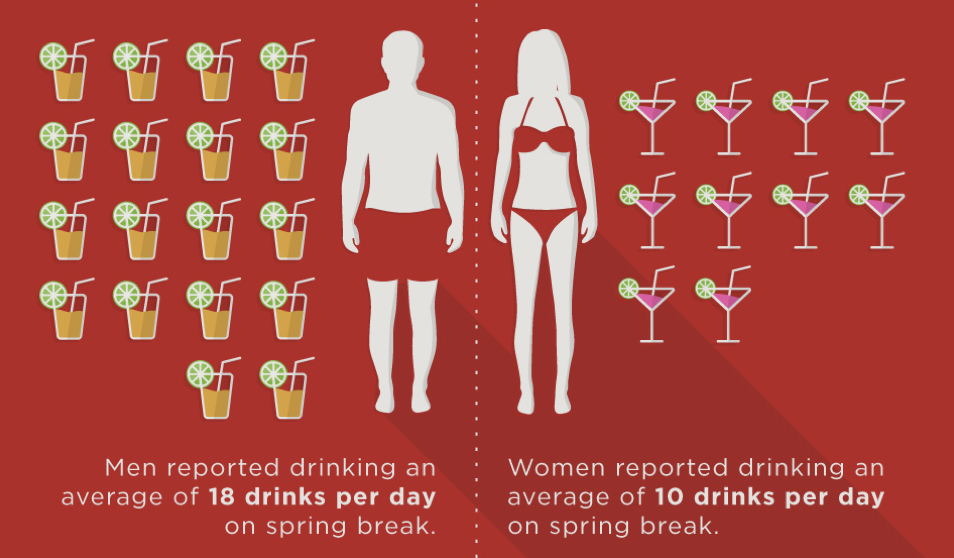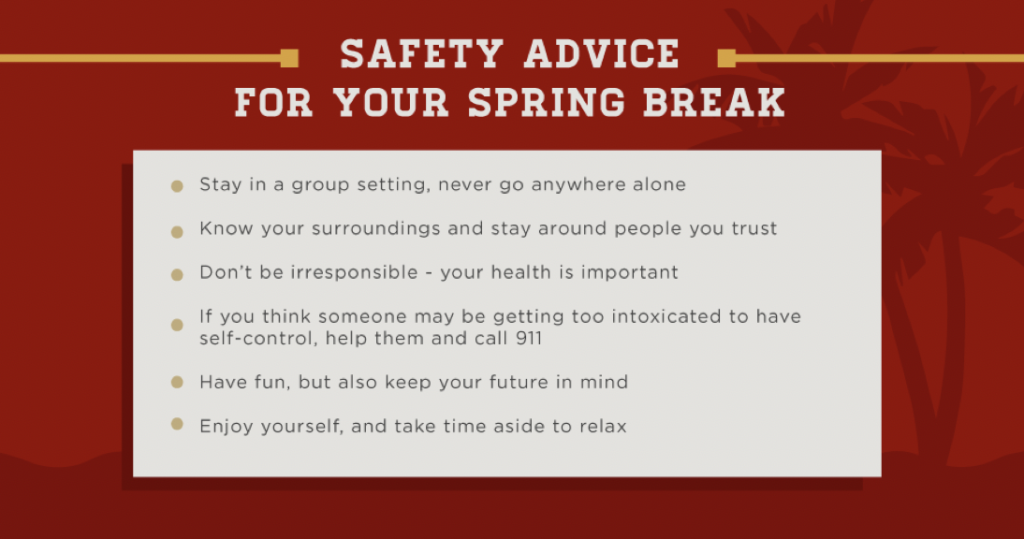Each year, approximately 1.5 million students go on spring break. For many, it’s a time to relax away from the classroom. However, this annual tradition can also lead to wild partying, substance abuse and other unsafe behavior. It is possible to enjoy spring break safely. Read on for our practical tips on planning ahead to ensure you have a great time — without the hangover.
Don’t Feel You Need to Drink
While alcohol may have become synonymous with spring break, you don’t have to partake to have a good time. No matter what you’ve seen in the movies or on TV, you aren’t obligated to drink. Even if your friends are drinking, that doesn’t mean you need to take part.
Not sure alcohol should be part of your spring break? Why not create a pro/con list or talk to someone you trust? If you decide not to indulge, you can still enjoy activities like beach or pool time, sports and alcohol-free activities. And at night there’s always a need for a designated driver or a grill master at those cookouts.
Plan Ahead
If you decide to drink — especially if you’re away from home — it’s important to establish an emergency contact. It’s easy to convince yourself that emergencies won’t happen to you, but they happen to someone, so why not be prepared? If something were to happen, your friends need to know who to get a hold of and how to reach them. It’s probably not a good idea to go out in a new town alone, even if you aren’t partying, but either way, take a minute to tell your friends where you’re going and when you’ll be back.
An even better idea is to use the buddy system. When you have a friend with you, not only do you have someone to keep you company, you also have someone to watch your drink when you use the restroom. For example, the University of Kansas has the Jayhawk Buddy System, where students intentionally look out for one another and help keep each other safe.
Pace Yourself
When you drink, don’t be afraid to be cautious. Drink slowly and set clear limits for how much alcohol you’ll consume. It’s also smart to eat something before you start drinking. Instead of automatically reaching for another drink, give yourself at least 20 minutes before having another one. In between, eat a snack and drink some water to stay hydrated.
Why is pacing important? When you have too many drinks in a short period of time, you may find yourself binge drinking. We know you’ve heard it before, but binge drinking really is unhealthy and unsafe. It’s defined as consuming between one and a half to two drinks an hour. But don’t focus only on the amount, since alcohol content varies widely by beverage — drinking without restraints is likely binge drinking.
Know the Consequences of Not Planning Ahead
Whenever you drink alcohol without limits, you are more likely to place yourself in risky situations. That doesn’t just include more serious consequences like getting sick, hangovers, blackouts, injury and drunk driving. When you’re under the influence of alcohol, you’re much more likely to say or do something you’ll regret. Is that buzz really worth ruining your chances with that girl or guy you’ve been trying to impress or damaging a friendship? And most bar fights don’t happen sober either. Add in the risk of sexually transmitted disease and alcohol poisoning, and the case for planning ahead gets even stronger. There’s nothing like seizures, passing out or vomiting to put a damper on a fun night out.
Protect Yourself
If you feel unsafe at any time while on spring break, do something about it. You don’t have to participate in any activity that makes you feel uncomfortable. Keep in mind that your inhibitions will be lower after drinking. This is just another reason why it is so important to not drink too much. For example, let’s say a few friends start playing a drinking game. While this may appear to be harmless at first, this kind of drinking leads to getting drunk. Your body simply cannot process that much alcohol in such a short amount of time. You’ll probably feel really good for a little while. But as time passes, you’ll get clumsy and your body will start to react slower than normal. That’s because alcohol depresses the parts of the brain that helps you make decisions, and you’re actually much more likely to do things you’d never do while you’re sober.
Be Honest With Yourself
If you have had struggles in the past with drinking too much, that’s a great argument for exercising caution on spring break. In addition, if your family has a history of problems with alcoholism, you need to be careful. Genes and environment are two of the biggest warning signs that you too may be at risk to become an alcoholic. Lastly, if you have a history of depression, alcohol can increase symptoms when you are drinking and even afterward.
Making smart decisions and planning ahead will help you avoid the pitfalls of overindulging and ensure you can enjoy your entire spring break.
Article by Jim Woods
A writer for Skywood Recovery
You may feel entirely helpless. You may be completely heartbroken over what addiction has done to you and your family. But here, we firmly believe that everyone has the ability to recover. We believe it because we’ve seen real healing revive the lives and hearts of so many who were once hopeless and heartbroken.
Sources
http://wellcommons.com/groups/trauma/2011/feb/17/jayhawk-buddy-system-keep/
https://www.cdc.gov/alcohol/fact-sheets/binge-drinking.htm
https://www.mayoclinic.org/diseases-conditions/alcohol-poisoning/symptoms-causes/syc-20354386
https://www.healthyplace.com/depression/antidepressants/antidepressants-and-alcohol-dont-mix/




0 Comments